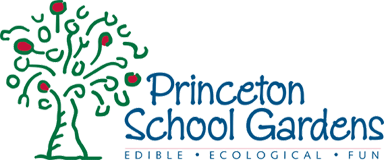PRINCETON, NJ – A collaboration between Princeton Public Schools (PPS) and Princeton School Gardens Cooperative (501c3) to optimize untapped campus resources for illustrating and amplifying curriculum has blossomed from a one-year pilot to a program supported by the district.
Food systems literacy programming uses interacting food, water and land systems on PPS campuses as hands-on, five-senses tools to engage faculty, facilities, staff, and administration in illustrating and amplifying curriculum, restoring ecological systems of campus landscapes, and in nurturing the wellbeing of the diverse student body.
Success empowers faculty, staff, and administration in optimizing existing resources – school foods, the Teaching Kitchens, campus lands, and the demographics of the students themselves – as tools for interdisciplinary teaching and for modeling tenets of reciprocity for our own bodies, for each other, for our communities, and for the natural world.
Success, for students, and by extension, for their parents and for community members, provides lifelong skills that foster equity and wellbeing, individual agency, natural systems stewardship, and associated pleasures – and even awe – of palate, plate, people, and planet.
The one-year pilot began in the spring of 2023; in August 2024, the district welcomed its second coordinator, Shannon Barlow, MPH. Ms Barlow brings to the table experience in project management of food systems literacy efforts and in curriculum development on climate change, the food system, nutrition, and physical literacy. She also has experience in grants review and financial reports review, along with conducting food waste audits and research. Ms. Barlow earned her Master of Public Health from Rutgers School of Public Health and her BA from Rider University.
In her role as coordinator, Ms Barlow will build upon the successes achieved during the year-long appointment of the first coordinator, Tomia MacQueen. Mrs. MacQueen focused mainly on expanding a PSGC marquee program, Garden State on Your Plate, into all six schools and their cafeterias, and across all 10 months of the school year. She also created camaraderie and organizational structure for the district’s Edible Gardens Educators/Stewards.
Ms. Barlow will work behind the scenes, and in particular, with the district’s new food service provider, Pomptonian, which offers with every meal purchase unlimited servings of fruits and vegetables from its “Farm Stand” each day.
Food Systems Literacy draws upon the goal to build inclusivity and equity as directed by the district’s strategic plan, along with the innovative New Jersey Climate Change Education mandate, the growing body of research that links connection to the natural world with resilience and wellbeing, and, the understanding of food choices and their effects on the lifelong health of people and planet.
Priorities for Ms. Barlow include work toward:
- Frugally and simply matching school foods to curriculum, to seasons, to student demographics, to equity, and to the district’s Edible Gardens at each of the six campuses;
- Strengthening and rooting the newly expanded Garden State on Your Plate farm-to-table program, which brings chefs and farmers into school cafeterias during lunchtime where they serve up samples of locally grown and simply prepared produce;
- Developing and implementing with the community’s water flow experts the capture and conservation of water for irrigation of Edible Gardens and for plantings of native perennials; and,
- Facilitating, alongside the Princeton Environmental Commission and other nonprofits, multiple-layered micro food forest plantings and maintenance that connect Princeton Middle School and Princeton High School via an “emerald necklace” and support biodiversity, pollinators, and habitat creation.
The success of this position, for students, and by extension, for their parents and community members, will result in the development of lifelong skills that foster wellbeing and individual agency, natural systems stewardship, and the associated pleasures of palate, plate, people, and planet.
Plans are to embed this program within the district curriculum to make it sustainable, long-term, and from it, create a free and available modular template for other schools, said Dr. Joy Barnes-Johnson, science supervisor for grades 6-12, who works alongside Ms. Barlow on the program.
“Food has myriad roles in our lives, and it connects to nearly every academic subject,” said Dr. Barnes-Johnson, of the program. “Our food system affects and is affected by the environment and biodiversity, the economy, the political system, public health, and personal wellbeing – and joy and robustness. We want to develop this program so that we can connect and strengthen our own district, and then share everything we’ve learned with other districts to connect and strengthen them.”
The original pilot program was made possible by the longtime and generous financial support of Church & Dwight Employee Giving Fund; Bent Spoon; Lillipies Bakery; Small World Coffee, Whole Earth Center; Princeton Garden Club; Terra Momo Restaurant Group, McCaffrey’s Supermarkets; Ace Hardware; Princeton University; Mrs. G Appliances; the Robert Wood Johnson Foundation; the Ryland Inn in Whitehouse, NJ; Zone Seven, Fenwick Hospitality Group; the faculty, staff, facilities department and administration of Princeton Public Schools; farmers, restaurateurs and artisan producers; and every parent and community member who, since 2005, has scooped soup for Garden State on Your Plate – the Farm to Table program – in the school cafeterias; lugged tools and garden gloves to build and tend Edible Gardens at each of the district’s six campuses; and ensured safety-first skills in the PPS Teaching Kitchens.
